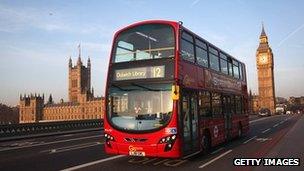Blind-spot safety technology should be mandatory, report says
- Published

The number of accidents involving big vehicles and cyclists has risen, researchers said
All buses and lorries in the UK should be fitted with collision-avoidance technology by 2015, a report has recommended.
The Institution of Mechanical Engineers (IMechE) said more could be done to protect those in drivers' blind-spots.
The report suggested the adoption of available technology, such as specialised sensors warning drivers of nearby cyclists.
The report also called for mandatory automated emergency response systems.
The IMechE said services like <link> <caption>eCall</caption> <url href="http://ec.europa.eu/information_society/activities/esafety/ecall/index_en.htm" platform="highweb"/> </link> - which can inform emergency services of an accident even if a driver is unconscious - had the potential to cut road fatalities by as much as 10%.
Seriously injured
"The alarming rise in cyclist deaths on British roads needs to be addressed urgently," said Philippa Oldham, head of transport at the Institution of Mechanical Engineers.
"Cyclist deaths have risen by 7% in the past year, with about eight cyclists being killed or seriously injured daily on British roads.
"A number of these deaths could be prevented if technology to prevent driver 'blind spots' were made mandatory for all large vehicles."
<link> <caption>The report</caption> <url href="http://www.imeche.org/Libraries/Knowledge/IMechE_Intelligent_Transport_Intelligent_Society.sflb.ashx" platform="highweb"/> </link> , published on Thursday, recommended the adoption of technology called Lateral Safe, a collision avoidance system being developed by the European Council for Automotive Research and Development.
The system uses sensors placed around large vehicles to warn drivers of potential obstacles, including cyclists and pedestrians. Many accidents are caused when an obstacle appears in a driver's blind-spot - an area not visible in the vehicle's mirrors.
Other suggestions included the adoption of autonomous driving technology, <link> <caption>such as those found in Google's Driverless car</caption> <url href="http://www.bbc.co.uk/news/technology-16197664" platform="highweb"/> </link> , which uses data gathered using Google Street View as well as sensors and cameras on the car.
Ms Oldham added: "By putting the UK at the forefront of intelligent transport technology we can also build an industry that is set to redefine the car in the next few decades, tapping into a market that will be worth about 拢40bn by 2020."
- Published4 April 2012
- Published7 March 2012
- Published6 February 2012